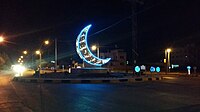Suhur
This article needs additional citations for verification. (September 2009) |

Sahūr, Suhūr or Suhoor (Arabic: سحور saḥūr, lit. "of the dawn", "pre-dawn meal"; is an Islamic term referring to the meal consumed early in the morning by Muslims before fasting, sawm, before dawn during or outside the Islamic month of Ramadan. The meal is eaten before fajr prayer.[1] Sahur as the morning meal is matched by iftar as the evening meal, during Ramadan, replacing the traditional three meals a day (breakfast, lunch and dinner),[2] although in some places dinner is also consumed after Iftar later during the night. Being the last meal eaten by Muslims before fasting from dawn to sunset during the month of Ramadan, sahur is regarded by Islamic traditions as a benefit of the blessings in that it allows the person fasting to avoid the crankiness or the weakness caused by the fast.
According to a hadith in Sahih al-Bukhari, Anas ibn Malik narrated, "The Prophet said, 'take sahur as there is a blessing in it.'"[3]
Name variations
| Region/country | Language | Main |
|---|---|---|
| Arab World | Arabic dialects | سحور (Saḥūr) |
| Yorubaland | Yoruba | Sãrì |
| Iran, Afghanistan, Tajikistan, Bangladesh | Dari, Tajik, Persian,Bengali | سحری (Sahari, Sehri, সেহরী) |
| Pashtunistan | Pashto | پیشلمي (Peshlamai), پیشمني (Peshmanai) [4] |
| Punjab | Punjabi | ਸਰਗੀ, سرگی (Sargi) |
| South Asia | Bengali, Hindi, Urdu | সেহরী (Sehri), سحری (Sehri), सहरी (Sahri) |
| Sylhet | Sylheti | ফতা (Fota), ফতাবেলা, ফতাবালা (Fotabala, Fothabala) |
| Azerbaijan | Azeri | Sahur |
| Albania, Kosovo | Albanian | Syfyri |
| Greater Somalia | Somali | Suxuur |
| Malay Peninsula, Turkey | Indonesian, Javanese, Turkish, Malay | Sahur |
| Hausaland | Hausa | Sahuri |
| Uzbekistan | Uzbek | Sahar |
| East Africa | Kiswahili | Daku |
| China | Chinese | 封齋飯 (Fēng zhāifàn) |
| Russia | Chechen, Russian, Bashkir | Сәхәр, Cyxyp |
Mesaharati
The mesaharati (public waker)[5] is a public waker for sahur and dawn prayer during Ramadan.[6][7][8] According to the history books, Bilal Ibn Rabah was the first mesaharati in Islamic history, as he used to roam the streets and roads throughout the night to wake people up.[9]
The occupation is summed up by Abu Rabah, a mesaharati in his neighbourhood in the old city of Damascus: "My duty during the holy month of Ramadhan is to wake people up in the old city of Damascus for prayers and Sahur meal."[10] According to Abbas Qatish, who is considered Sidon's best mesaharati, the attributes every mesaharati should possess are physical fitness and good health, "because he is required to walk long distances every day. He should also have a loud voice and good lungs, as well as an ability to read poems. A mesaharati should supplicate God throughout the night to wake the sleepers."[11]
The tradition is practiced in countries such as Egypt, Syria, Sudan, Saudi Arabia, Jordan, Pakistan and Palestine. However, there has been a gradual disappearance of the mesaharati due to several factors, including: Muslims staying up later; using technology such as alarms clocks to awake for sahur; and louder and larger homes and cities that make the voice of the mesaharati harder to hear.[12]
See also
- Iftar - sunset meal, the meal after fasting is over at night.
References
- ^ BBC - Schools - Religion - Islam, retrieved 11 April 2010
- ^ BBC - Schools - Religion - Islam, retrieved 11 April 2010
- ^ Bukhari: Book 3: Vol. 31: Hadith 146 (Fasting).
- ^ Bellew, H.C. (2003). A Dictionary of the Pukkhto Or Pukshto Language.
- ^ "Pictures: Celebrating Ramadan Around the World". National Geographic Society. July 19, 2014. Retrieved 10 August 2014.
- ^ Linda Wong. Sentence essentials: a grammar guide. Houghton Mifflin, 2002. p. 100. ISBN 9780618154821.
- ^ Angelo Colorni. Israel for Beginners: A Field Guide for Encountering the Israelis in Their Natural Habitat. Gefen Publishing House Ltd, 2011. p. 84. ISBN 9789652294838.
- ^ Jamāl Ghīṭānī; Farouk Abdel Wahab (translator). The Zafarani Files. American Univ in Cairo Press, 2009. p. 333. ISBN 9789774161902.
{{cite book}}:|author2=has generic name (help) - ^ Rima Al-Mukhtar (10 August 2011). "Ramadan Mesaharati". Arab News. Retrieved 10 August 2014.
- ^ HUMMAM SHEIKH ALI (August 19, 2011). "Charm of Ramadhan in Damascus". Xinhua. Brunei Times Sdn Bhd. Retrieved 10 August 2014.
- ^ Vivian Haddad (23 Jul 2014). "The Mesaharati, Still Part of Sidon's Ramadan Tradition". Asharq Al Awsat. Retrieved 10 August 2014.
- ^ Rima Al-Mukhtar (10 August 2011). "Ramadan Mesaharati". Arab News. Retrieved 10 August 2014.

